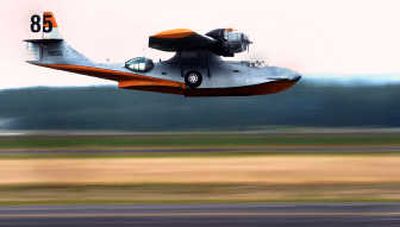PBY ready, owner says

A World War II-vintage airplane that’s fought fires in Eastern Washington for more than 20 years is ready to go.
Housed at Deer Park Airport, the Patrol Bomber Y scooper plane underwent its annual maintenance and preparations for fire season this week.
But owner Bud Rude knows the plane’s forced retirement is likely inevitable.
The state Department of Natural Resources didn’t renew the plane’s contract this year, citing its age and federal requirements that it not be used on federal land. Rude protested the decision, which delayed the state in finding a replacement.
A supplemental federal contract for a newer plane will be in place by the start of fire season in July, said Mark Kahley, resource protection division manager for the DNR.
“We will be there,” Kahley said.
The replacement plane will stay in Deer Park, not Moses Lake as previously considered, Kahley said. At least two firefighting helicopters likely will be located in Omak and Colville, he said.
Credited by local fire officials with saving homes from forest fires, the PBY plane fought 35 fires on 32 days from July 5 to Oct. 12 last year, according to the DNR.
The plane scoops water from lakes and rivers at the rate of about 100 gallons per second and can hold up to 1,500 gallons. Before its contract expired, Rude’s Tanker 85 was thought to be the only PBY still working a job. The 30 or so other PBYs in the United States are used for tourism and recreation, Rude said.
Ed Lewis, chief of Spokane County Fire District 4 in Deer Park, once called Rude’s PBY one of the agency’s “front-line defenses” for homes in the Spokane area.
Rude said the plane has an impeccable safety record and so few flight hours that it trumps more modern planes. And he offers it for much cheaper than any replacement plane will cost.
“Age is of no consequence,” Rude said. “It’s like judging a well by the handle on the pump. You just can’t do it.”
The PBY’s last contract was for $250,000 for a 100-day contract, and beyond that about $600 an hour. Kahley acknowledged that a new plane could cost much more.
“When you’re using technology designed in the 1980s instead of the 1940s, that tends to be more expensive,” he said.
Kahley said the government isn’t questioning the plane’s basic certification, it’s questioning whether it can be certified to fight fires, which the federal government has said it can’t.
Rude isn’t worried about finding the plane a new home. He’s fielded several calls from other interested municipalities, and vintage-plane enthusiasts will always pay top dollar. He sold a PBY in Montana last month for $1 million. The man who bought it plans to convert it into a yacht, Rude said.
But he is worried about the government’s reasoning behind nixing the plane’s contract, given its safety record, quality maintenance history and cost.
“This airplane is far, far from being at the end of its career,” he said. “It’s a travesty.”